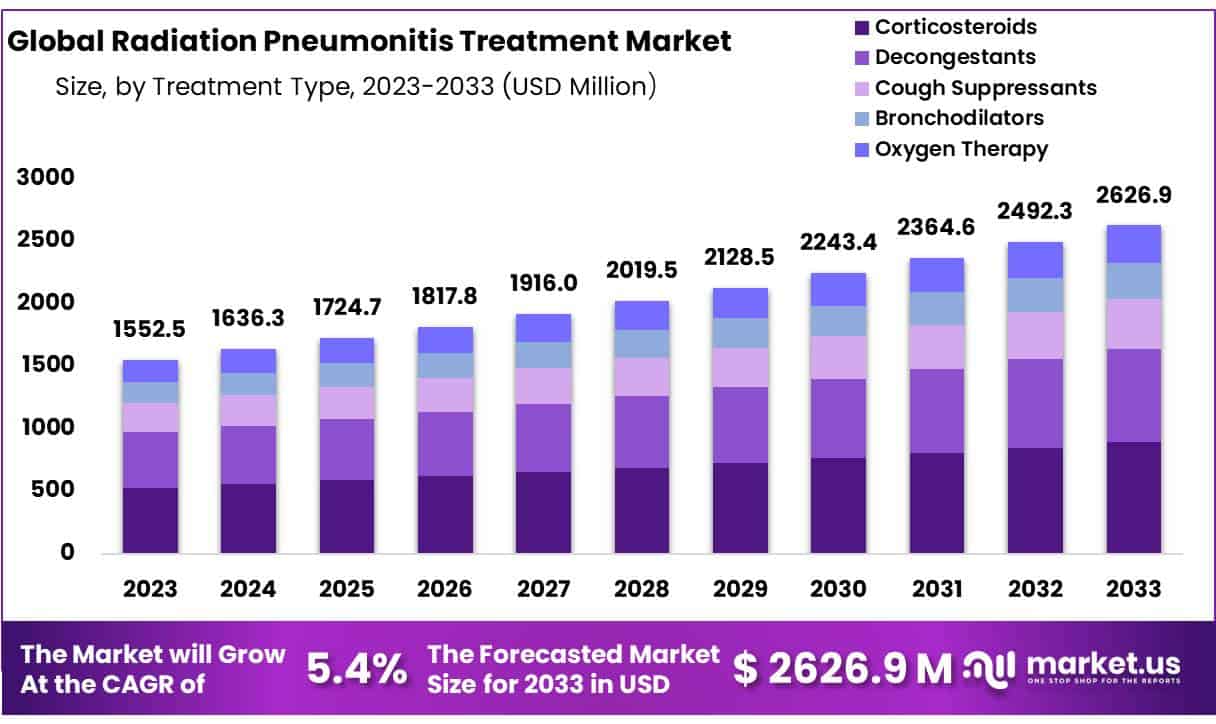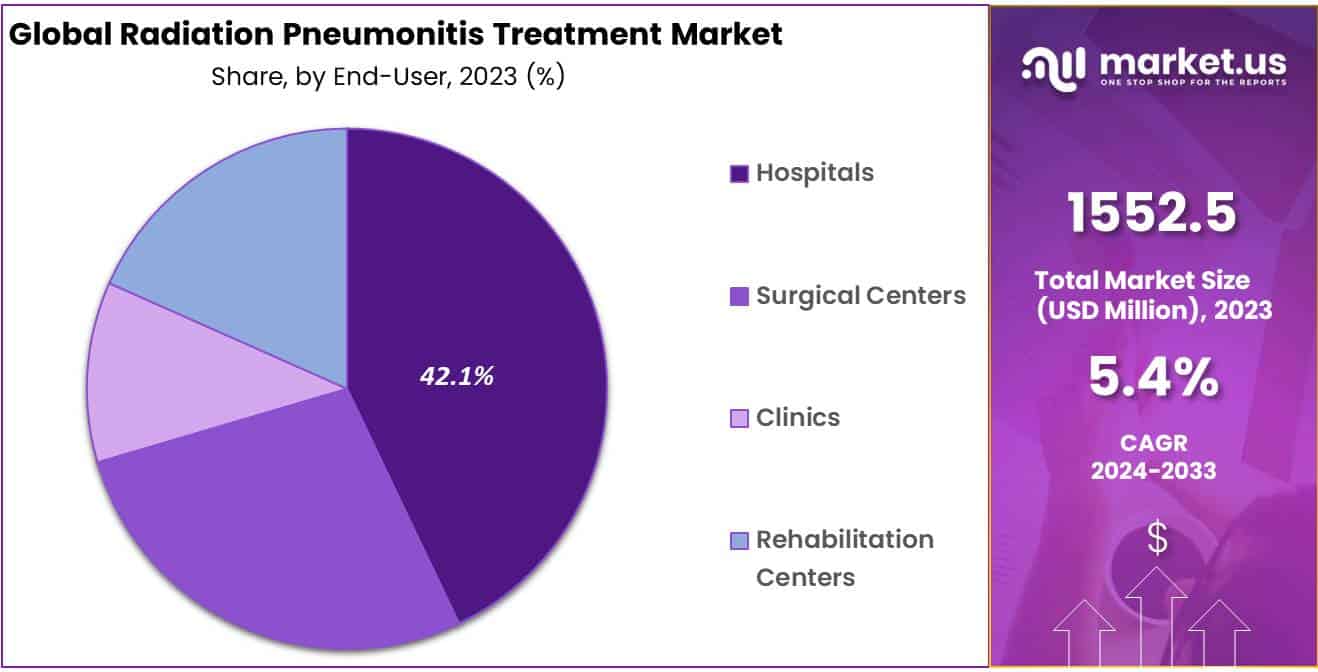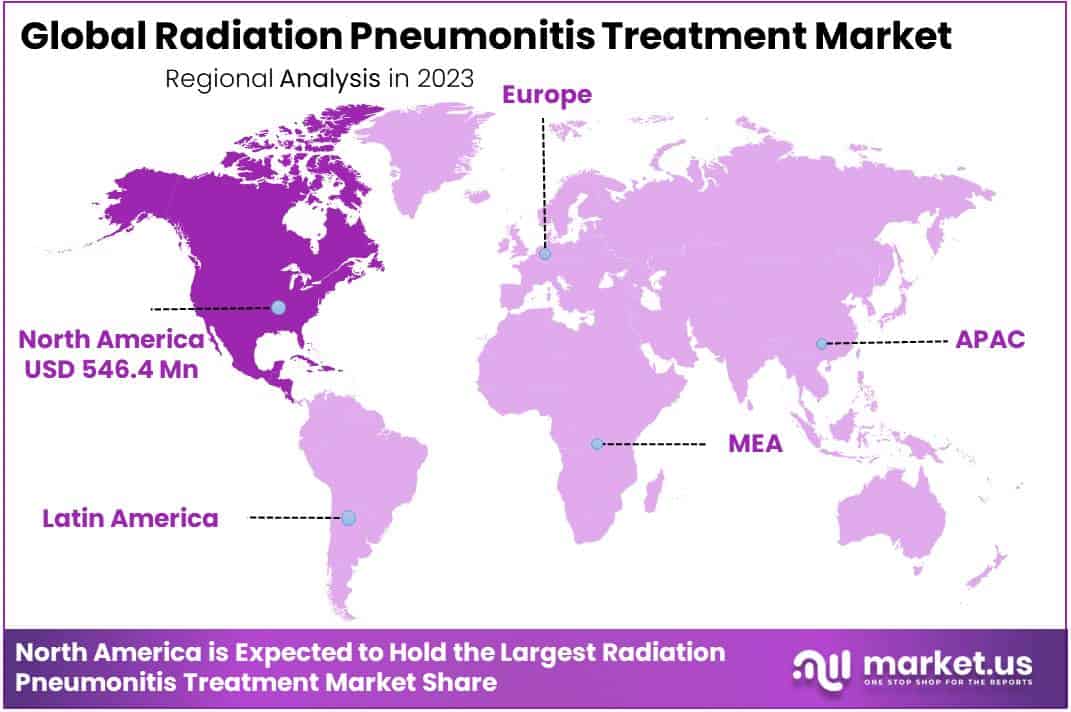Global Radiation Pneumonitis Treatment Market By Treatment Type (Corticosteroids, Decongestants, Cough Suppressants, Bronchodilators, Oxygen Therapy) By End-User ( Hospitals, Surgical Centers, Clinics, Rehabilitation Centers) By Region, and Key Companies - Industry Segment Outlook, Market Assessment, Competition Scenario, Trends and Forecast 2024-2033
- Published date: March 2024
- Report ID: 73941
- Number of Pages: 213
- Format:
-
keyboard_arrow_up
Quick Navigation
Market Overview
The Global Radiation Pneumonitis Treatment Market size is expected to be worth around USD 2626.9 Million by 2033 from USD 1552.5 Million in 2023, growing at a CAGR of 5.4% during the forecast period from 2024 to 2033.
Radiation pneumonitis treatment refers to any medical interventions designed to manage and alleviate inflammation caused by radiation therapy on lung tissue. Radiation pneumonitis is a side effect often experienced by cancer patients undergoing radiation treatments for tumors located in their chest area. The condition occurs as healthy lung tissue becomes exposed to radiation exposure, leading to inflammation and injury to healthy lung tissue. Treatment strategies for radiation pneumonitis generally consist of multidisciplinary care measures that utilize corticosteroids to decrease inflammation, bronchodilators to facilitate breathing, oxygen therapy to enhance oxygenation, and supportive care measures to alleviate symptoms such as coughing, chest pain and shortness of breath. The aim is to mitigate symptoms, improve lung function and enhance quality of life during and post radiation therapy treatment.
Pneumonitis caused by radiation is a type of lung injury. While bacteria or viruses cause pneumonia, an irritant causes pneumonitis, which is similar to an allergy. After receiving radiation treatments to the lungs or chest area, some individuals develop radiation pneumonitis. Pneumonitis affects 5-15% of individuals who receive radiation treatment for lung cancer. It usually appears around 4-12 weeks following radiation treatment, however, it can appear as soon as one week after treatment.
In other circumstances, it grows over several months at a gradual pace. A long course of corticosteroids, such as prednisone, is the most usual treatment for severe pneumonitis. These are potent anti-inflammatory drugs that work by suppressing individual immune systems to minimize inflammation of the lungs. During the process of treatment, a patient may require oxygen therapy to assist with breathing, depending on the symptoms of a given patient.

Key Takeaways
- Market Size: Radiation Pneumonitis Treatment Market size is expected to be worth around USD 2626.9 Million by 2033 from USD 1552.5 Million in 2023.
- Market Growth: The market growing at a CAGR of 5.4% during the forecast period from 2024 to 2033.
- Treatment Type Analysis: Corticosteroids have gained an overwhelming share of the Radiation Pneumonitis Treatment Market, accounting for 34.1%.
- End-User Analysis: Hospitals dominate the Radiation Pneumonitis Treatment Market with an impressive 42.1% share.
- Regional Analysis: North America held 35.2% of the radiation pneumonitis treatment market share in 2023.
Treatment Type
Corticosteroids have gained an overwhelming share of the Radiation Pneumonitis Treatment Market, accounting for 34.1%. This demonstrates their importance in controlling radiation-induced lung inflammation; corticosteroids offer powerful anti-inflammatory effects which help alleviate symptoms while also protecting against further damage post radiotherapy therapy.
Other treatments modalities, such as decongestants, cough suppressants, bronchodilators, and oxygen therapy play key roles in managing radiation pneumonitis. Decongestants help alleviate nasal congestion while cough suppressants decrease coughing spell frequency and intensity. Bronchodilators help widen airways to facilitate easier breathing while oxygen therapy ensures adequate oxygenation of damaged lung tissue.
Corticosteroids remain the market leader, offering individuals battling radiation pneumonitis a comprehensive strategy for effective management. Thanks to advances in treatment efficacy and patient outcomes, market growth should remain positive; giving those facing this challenging condition hope for treatment relief.
End-User
Hospitals dominate the Radiation Pneumonitis Treatment Market with an impressive 42.1% share. This demonstrates how critical hospitals are in providing comprehensive care to those undergoing radiation-induced lung inflammation therapy, offering facilities equipped with state-of-the-art equipment and skilled healthcare personnel that foster an ideal atmosphere for diagnosing, treating and managing radiation pneumonitis effectively.
Radiation pneumonitis treatment entails several end-users beyond hospitals, including surgical centers, clinics, and rehabilitation centers. Surgi-cial centers may perform interventions such as biopsies or surgeries on an outpatient basis while clinics provide outpatient care with follow-up consultations; rehabilitation centers focus on improving overall well-being and respiratory function through tailored rehabilitation programs for their patients.
With hospitals leading the charge and supported by an expansive network of facilities, radiation pneumonitis treatment market is set for steady expansion. Collaboration among these end users ensures comprehensive care delivery with promise of improved outcomes for those suffering from this condition.

Market Segments
Treatment Type
- Corticosteroids
- Decongestants
- Cough Suppressants
- Bronchodilators
- Oxygen Therapy
End-User
- Hospitals
- Surgical Centers
- Clinics
- Rehabilitation Centers
Driver
Rising Incidence of Lung Cancer
The ever-increasing prevalence of lung cancer serves as a significant driver for the radiation pneumonitis treatment market. Lung cancer is one of the most prevalent cancers worldwide and radiation therapy remains one of the primary forms of treatment; thus as more diagnosed cases emerge, demand for effective radiation pneumonitis treatments will grow accordingly.
Technological Advancements in Radiation Therapy
Technological advances in radiation therapy techniques have resulted in better treatment outcomes and decreased side effects, including radiation pneumonitis. Innovations like intensity-modulated radiation therapy (IMRT), proton therapy and stereotactic body radiation therapy (SBRT) allow more precise targeting of cancer cells while protecting healthy lung tissue around them; this boosts efficacy while decreasing radiation pneumonitis incidences; driving market growth as a result.
Trend
Personalized Medicine Approach
There has been an upsurge in personalized medicine in cancer treatments, particularly radiation therapy. Advancements in genomic profiling and biomarker identification enable clinicians to tailor treatment regimens based on individual patient characteristics – such as genetic predispositions for radiation-induced lung injury. Thus, personalized approaches help optimize efficacy while decreasing risks such as radiation pneumonitis, driving adoption in the market.
Focus on Combination Therapies
Combination therapies are becoming an increasingly popular trend for treating radiation pneumonitis, with researchers exploring their synergistic effects with immunotherapy, targeted therapies and supportive interventions such as anti-inflammatory agents or antioxidants to boost efficacy while mitigating side effects. Combination approaches not only improve treatment outcomes but can also decrease incidence and severity rates resulting in market expansion.
Restraint
Risk of Treatment-Related Toxicity
Technological advancements aside, radiation therapy poses inherent risks of treatment-related toxicity, including radiation pneumonitis. Lung damage limits how much radiation therapy can safely be delivered safely; therefore compromising treatment efficacy particularly among advanced-stage lung cancer patients. Concerns related to treatment side effects could discourage individuals from opting for radiation therapy and limit market growth.
Limited Access to Advanced Radiation Therapy
Lack of access to facilities and expertise providing advanced radiation therapy is one of the major barriers facing radiation pneumonitis treatment markets today. Disparities between healthcare infrastructure and resources limit adoption of advanced radiation techniques, limiting patient access to optimal treatment modalities while increasing risks related to treatments such as radiation pneumonitis.
Opportunity
Opportune Momentum of Stereotactic Radiation Therapy
The growing adoption of stereotactic body radiation therapy (SBRT) for early-stage lung cancer provides significant opportunities in terms of radiation pneumonitis treatment market. SBRT delivers highly targeted radiation doses directly to tumor sites while sparing surrounding healthy tissues thereby decreasing risk of radiation pneumonitis. As SBRT becomes an established standard of care, demand for effective radiation pneumonitis treatments should increase accordingly.
Development of Novel Therapeutics
Novel therapeutics targeting the mechanisms underlying radiation pneumonitis offer significant potential for market expansion. Researchers are exploring various approaches, including anti-inflammatory agents, cytokine inhibitors and radioprotective agents, to reduce lung injury caused by radiation therapy and enhance tissue repair following radiation therapy treatment. If new therapeutics with improved efficacy and safety profiles emerge soon enough for radiation pneumonitis treatment options available to them this could significantly expand treatment options available and thus drive market expansion.
Regional Analysis
North America held 35.2% of the radiation pneumonitis treatment market share in 2023, attributable to its leadership in healthcare innovation and advanced cancer care services. Factors such as an advanced healthcare infrastructure, technological innovations in radiation therapy and high rates of lung cancer help explain North America’s prominence. Strict regulatory standards, favorable reimbursement policies, and collaborative research efforts all play a part in strengthening this region’s position.
North America stands out as an innovative force when it comes to cancer treatments and patient care, leading the charge in radiation pneumonitis treatments and providing wide access to cutting-edge therapies – and has maintained its significant market presence globally.

Key Regions and Countries
North America
- The US
- Canada
- Mexico
Western Europe
- Germany
- France
- The UK
- Spain
- Italy
- Portugal
- Ireland
- Austria
- Switzerland
- Benelux
- Nordic
- Rest of Western Europe
Eastern Europe
- Russia
- Poland
- The Czech Republic
- Greece
- Rest of Eastern Europe
APAC
- China
- Japan
- South Korea
- India
- Australia & New Zealand
- Indonesia
- Malaysia
- Philippines
- Singapore
- Thailand
- Vietnam
- Rest of APAC
Latin America
- Brazil
- Colombia
- Chile
- Argentina
- Costa Rica
- Rest of Latin America
Middle East & Africa
- Algeria
- Egypt
- Israel
- Kuwait
- Nigeria
- Saudi Arabia
- South Africa
- Turkey
- United Arab Emirates
- Rest of MEA
Key Player Analysis
This report profiles major players involved in Radiation Pneumonitis Treatment Market under its Competitive Landscape and Company Profile chapters. Evaluation of key market players involves evaluating their offerings, financial statements, key developments, strategic approach to market position and geographic penetration and other features of significance. This chapter also presents a SWOT analysis, including winning imperatives, current focus strategies, and threats from competition for three to five major market players.
Furthermore, market studies can be tailored to fit client requirements by including only specific companies in their list of participants. The Competitive Landscape section of this report includes information regarding the top five companies’ ranking, recent developments such as partnerships, mergers and acquisitions, product launches etc. as well as regional presence as well as industry presence based on market and Ace matrix metrics.
Market Key Players
- Bayer AG
- Pfizer Inc
- Fujifilm Diosynth Biotechnologies
- LGM Pharma
- Caesar & Loretz GmbH
- Avik Pharmaceutical Limited
- Other Key Players
Recent Developments
- Bayer AG: In March 2024, Bayer AG announced a strategic acquisition of a major biotech company that specializes in treatment for radiation pneumonitis. The acquisition is intended to expand Bayer’s portfolio as well as strengthen its position on the market.
- Pfizer Inc: In November 2021, Pfizer Inc collaborated with an institute of research to develop an innovative immunosuppressive medication specifically made for treatment of radiation pneumonitis.
- Fujifilm Diosynth Biotechnologies: In 2023, Fujifilm Diosynth Biotechnologies introduced the most advanced cytokine-targeted therapy available for radiation pneumonitis. The therapy has shown improved patient outcomes and decreased adverse negative effects.
- LGM Pharma: LGM Pharma has successfully launched a brand new blood test kit that allows for early detection of radiation pneumonitis in rehabilitation centers as well as surgical centers. The kit delivers quick and precise results, which aids in the timely treatment.
- Caesar & Loretz GmbH: Caesar & Loretz GmbH unveiled an advanced X-ray check system to monitor changes in the lung caused by radiation in cancer patients.
Report Scope
Report Features Description Market Value (2023) USD 1552.5 Million Forecast Revenue (2033) USD 2626.9 Million CAGR (2024-2033) 5.4% Base Year for Estimation 2023 Historic Period 2018-2022 Forecast Period 2024-2033 Report Coverage Revenue Forecast, Market Dynamics, Competitive Landscape, Recent Developments Segments Covered By Treatment Type (Corticosteroids, Decongestants, Cough Suppressants, Bronchodilators, Oxygen Therapy) By End-User ( Hospitals, Surgical Centers, Clinics, Rehabilitation Centers) Regional Analysis North America-US, Canada, Mexico;Europe-Germany, UK, France, Italy, Russia, Spain, Rest of Europe;APAC-China, Japan, South Korea, India, Rest of Asia-Pacific;South America-Brazil, Argentina, Rest of South America;MEA-GCC, South Africa, Israel, Rest of MEA Competitive Landscape Bayer AG, Pfizer Inc, Fujifilm Diosynth Biotechnologies, LGM Pharma, Caesar & Loretz GmbH, Avik Pharmaceutical Limited, Other Key Players Customization Scope Customization for segments, region/country-level will be provided. Moreover, additional customization can be done based on the requirements. Purchase Options We have three licenses to opt for: Single User License, Multi-User License (Up to 5 Users), Corporate Use License (Unlimited User and Printable PDF) Frequently Asked Questions (FAQ)
What is radiation pneumonitis?Radiation pneumonitis is inflammation of the lung tissue caused by radiation therapy, typically occurring as a side effect in cancer patients undergoing radiation treatment for tumors in the chest area.
How big is the Radiation Pneumonitis Treatment Market?The global Radiation Pneumonitis Treatment Market size was estimated at USD 1552.5 Million in 2023 and is expected to reach USD 2626.9 Million in 2033.
What is the Radiation Pneumonitis Treatment Market growth?The global Radiation Pneumonitis Treatment Market is expected to grow at a compound annual growth rate of 5.4%. From 2024 To 2033
Who are the key companies/players in the Radiation Pneumonitis Treatment Market?Some of the key players in the Radiation Pneumonitis Treatment Markets are Bayer AG, Pfizer Inc, Fujifilm Diosynth Biotechnologies, LGM Pharma, Caesar & Loretz GmbH, Avik Pharmaceutical Limited, Other Key Players.
What are the symptoms of radiation pneumonitis?Common symptoms of radiation pneumonitis include cough, shortness of breath, chest pain, fever, fatigue, and difficulty breathing. These symptoms may develop weeks to months after receiving radiation therapy.
How is radiation pneumonitis treated?Treatment for radiation pneumonitis may involve corticosteroids to reduce inflammation, bronchodilators to alleviate breathing difficulties, oxygen therapy to improve oxygen levels, and supportive care measures to manage symptoms.
What factors contribute to the growth of the radiation pneumonitis treatment market?Factors driving market growth include increasing incidence of lung cancer, advancements in radiation therapy technology, emphasis on personalized medicine approaches, and the development of novel therapeutics targeting radiation-induced lung injury.
 Radiation Pneumonitis Treatment MarketPublished date: March 2024add_shopping_cartBuy Now get_appDownload Sample
Radiation Pneumonitis Treatment MarketPublished date: March 2024add_shopping_cartBuy Now get_appDownload Sample -
-
- Bayer AG
- Pfizer Inc
- Fujifilm Diosynth Biotechnologies
- LGM Pharma
- Caesar & Loretz GmbH
- Avik Pharmaceutical Limited
- Other Key Players










